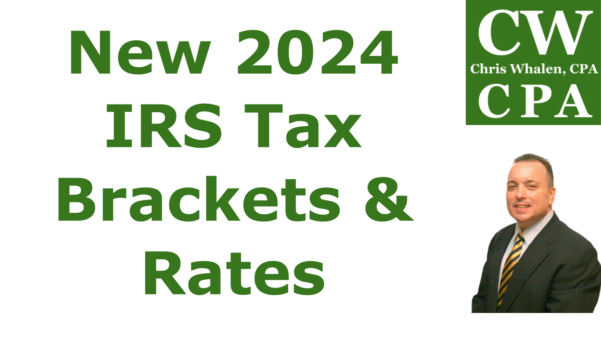Want my podcasts and blog posts delivered to your inbox? Click here to subscribe
Any Questions or Concerns right now? Stop reading and call me on (732) 673-0510.

WASHINGTON — The Internal Revenue Service today announced the annual inflation adjustments for more than 60 tax provisions for tax year 2024, including the tax rate schedules and other tax changes. Revenue Procedure 2023-34PDF provides detailed information about these annual adjustments.
New for 2024
Starting in calendar year 2023, the Inflation Reduction Act reinstates the Hazardous Substance Superfund financing rate for crude oil received at U.S. refineries, and petroleum products that entered into the United States for consumption, use, or warehousing. The tax rate is the sum of the Hazardous Substance Superfund rate and the Oil Spill Liability Trust Fund financing rate. For calendar years beginning in 2024, the Hazardous Substance Superfund financing rate is adjusted for inflation. For calendar year 2024 crude oil or petroleum products entered after
Dec. 31, 2016, will have a tax rate of $0.26 cents a barrel.
Highlights of changes in Revenue Procedure 2023-34:
NEW 2024 TAX RATES

OLD 2023 TAX RATES

The tax year 2024 adjustments described below generally apply to income tax returns filed in 2025. The tax items for tax year 2024 of greatest interest to most taxpayers include the following dollar amounts:
- The standard deduction for married couples filing jointly for tax year 2024 rises to $29,200, an increase of $1,500 from tax year 2023. For single taxpayers and married individuals filing separately, the standard deduction rises to $14,600 for 2024, an increase of $750 from 2023; and for heads of households, the standard deduction will be $21,900 for tax year 2024, an increase of $1,100 from the amount for tax year 2023.
- Marginal rates: For tax year 2024, the top tax rate remains 37% for individual single taxpayers with incomes greater than $609,350 ($731,200 for married couples filing jointly).The other rates are:35% for incomes over $243,725 ($487,450 for married couples filing jointly)
32% for incomes over $191,950 ($383,900 for married couples filing jointly)
24% for incomes over $100,525 ($201,050 for married couples filing jointly)
22% for incomes over $47,150 ($94,300 for married couples filing jointly)
12% for incomes over $11,600 ($23,200 for married couples filing jointly)The lowest rate is 10% for incomes of single individuals with incomes of $11,600 or less ($23,200 for married couples filing jointly).
- The Alternative Minimum Tax exemption amount for tax year 2024 is $85,700 and begins to phase out at $609,350 ($133,300 for married couples filing jointly for whom the exemption begins to phase out at $1,218,700). For comparison, the 2023 exemption amount was $81,300 and began to phase out at $578,150 ($126,500 for married couples filing jointly for whom the exemption began to phase out at $1,156,300).
- The tax year 2024 maximum Earned Income Tax Credit amount is $7,830 for qualifying taxpayers who have three or more qualifying children, an increase of from $7,430 for tax year 2023. The revenue procedure contains a table providing maximum EITC amount for other categories, income thresholds and phase-outs.
- For tax year 2024, the monthly limitation for the qualified transportation fringe benefit and the monthly limitation for qualified parking increases to $315, an increase of $15 from the limit for 2023.
- For the taxable years beginning in 2024, the dollar limitation for employee salary reductions for contributions to health flexible spending arrangements increases to $3,200. For cafeteria plans that permit the carryover of unused amounts, the maximum carryover amount is $640, an increase of $30 from taxable years beginning in 2023.
- For tax year 2024, participants who have self-only coverage in a Medical Savings Account, the plan must have an annual deductible that is not less than $2,800, an increase of $150 from tax year 2023, but not more than $4,150, an increase of $200 from tax year 2023. For self-only coverage, the maximum out-of-pocket expense amount is $5,550, an increase of $250 from 2023. For tax year 2024, for family coverage, the annual deductible is not less than $5,550, an increase of $200 from tax year 2023; however, the deductible cannot be more than $8,350, an increase of $450 versus the limit for tax year 2023. For family coverage, the out-of-pocket expense limit is $10,200 for tax year 2024, an increase of $550 from tax year 2023.
- For tax year 2024, the foreign earned income exclusion is $126,500, increased from $120,000 for tax year 2023.
- Estates of decedents who die during 2024 have a basic exclusion amount of $13,610,000, increased from $12,920,000 for estates of decedents who died in 2023.
- The annual exclusion for gifts increases to $18,000 for calendar year 2024, increased from $17,000 for calendar year 2023.
- The maximum credit allowed for adoptions for tax year 2024 is the amount of qualified adoption expenses up to $16,810, increased from $15,950 for 2023.
Items unaffected by indexing:
By statute, certain items that were indexed for inflation in the past are currently not adjusted.
- The personal exemption for tax year 2024 remains at 0, as it was for 2023. This elimination of the personal exemption was a provision in the Tax Cuts and Jobs Act.
- For 2024, as in 2023, 2022, 2021, 2020, 2019 and 2018, there is no limitation on itemized deductions, as that limitation was eliminated by the Tax Cuts and Jobs Act.
- The modified adjusted gross income amount used by taxpayers to determine the reduction in the Lifetime Learning Credit provided in § 25A(d)(2) is not adjusted for inflation for taxable years beginning after Dec. 31, 2020. The Lifetime Learning Credit is phased out for taxpayers with modified adjusted gross income in excess of $80,000 ($160,000 for joint returns).
Questions? Concerns? Call me on (732) 673-0510.
Get my podcasts and memos in your inbox by Clicking Here
Click here to request a consultation or ask me a question.
Please reach out to me without hesitation with any tax, business or
accounting question, and to schedule a consultation.
Tax Laws are complex.
It is very easy to make mistakes that can incur penalties.
Do you have a Tax, Accounting or Business Question?
Call Me Immediately. (732) 673-0510.
Is your CPA or Attorney
ignoring your Phone Calls and Emails?
Call Me Immediately. (732) 673-0510.
Remember,
“If We Aren’t Working For You, Then You Aren’t Working At Your Best”
Chris Whalen, CPA
(732) 673-0510
81 Oak Hill Road
Red Bank, NJ 07701
www.chriswhalencpa.com

Red Bank • Rumson • Colts Neck • Holmdel • Middletown • Lincroft • Brick • Toms River • Sea Bright • Deal • Little Silver • Long Branch • Asbury Park • Bradley Beach • Belmar • Brielle • Eatontown • Fair Haven • Farmingdale • Highlands • Atlantic Highlands • Howell • Locust • Monmouth Beach • Shrewsbury • Spring Lake • Tinton Falls • Monmouth County
#SmallBusinessSaturday #SmallBusinesses #cpa #irs #taxes #1040 #IRS #CPA #BusinessIdeas #incometaxes #incometax #jerseyshore #taxplanning #Accounting #TaxReturns #selfemployed



